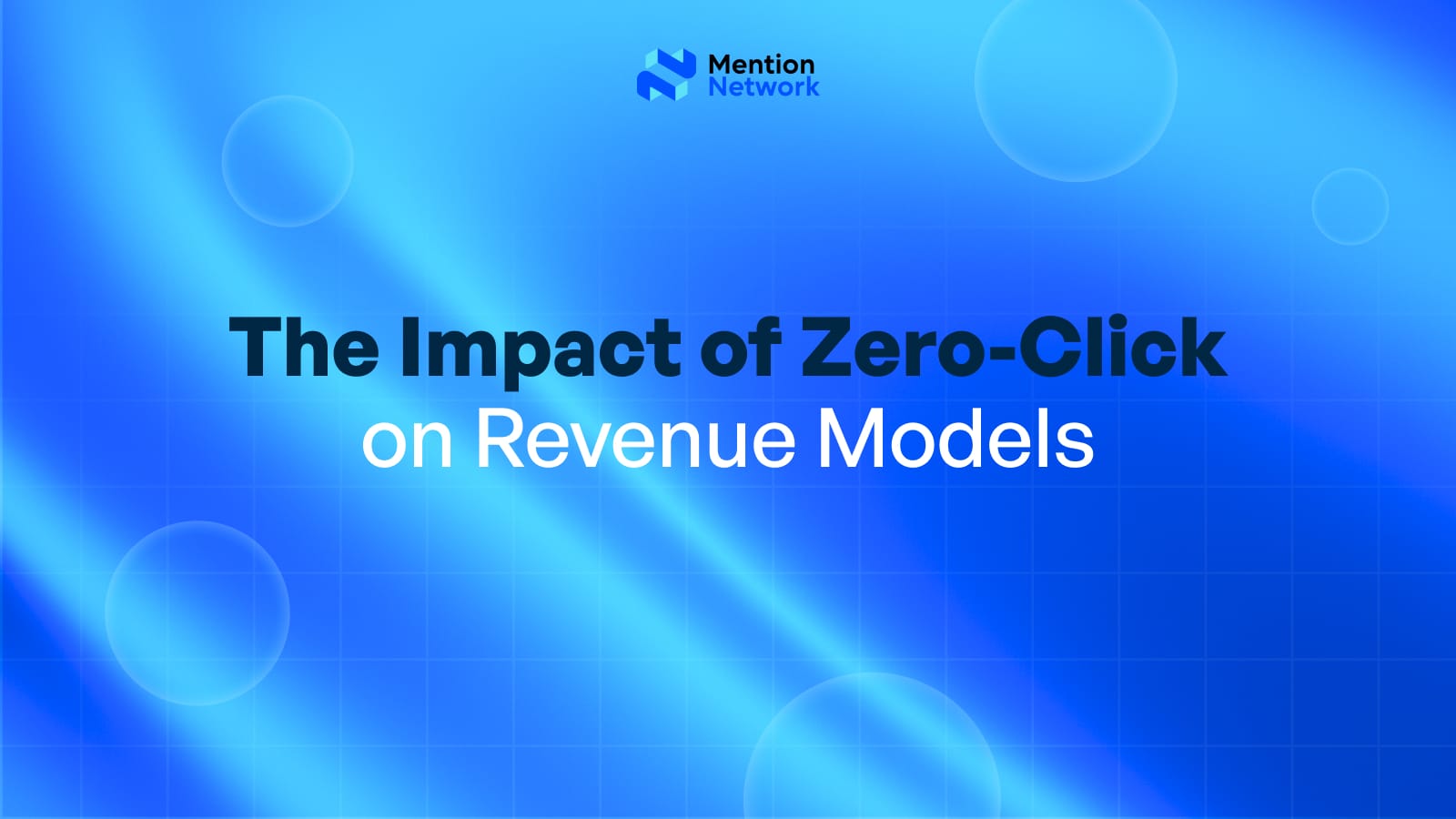The Impact of Zero-Click on Revenue Models

The digital marketplace is currently undergoing its most profound transformation since the advent of mobile search. The Search Engine Results Page (SERP), once a simple directory of links, has evolved into a fully functional answer engine. This evolution has birthed the Zero-Click Search, where user queries are resolved directly on Google, often without the searcher ever visiting a website.
Media publishers dependent on display advertising, e-commerce sites reliant on mass organic traffic, and lead generation businesses built on sheer volume are all feeling the pinch. Yet, this shift isn't a death knell, it's a powerful filter that rewards authority, efficiency, and strategic resource allocation.
This comprehensive analysis moves beyond surface-level traffic complaints to explore the deep structural changes required to not just survive, but thrive in the Zero-Click economy. We will dissect how successful brands are pivoting from click volume to conversion velocity, treating the SERP as a new, high-value stage in the customer journey. Embrace the reality: the click is scarce, but the value of the highly qualified impression has never been higher.
- ModelTraffic is Now Qualified: Zero-Click acts as a pre-qualification filter. The traffic you do receive is generally higher intent and closer to conversion.
- SERP is the New Top-of-Funnel: Brand visibility, through Featured Snippets and AI Overviews, must be prioritized as the primary awareness stage metric.
- The Content Paywall Must Shift: Revenue models must pivot from display ads (volume-dependent) to high-value transactions and exclusive, non-summarizable content.
- Data Structure is Revenue Structure: Implementing comprehensive Schema Markup is mandatory for securing high-visibility rich results that drive qualified interactions.
- Conversion Velocity Wins: Focus on maximizing conversion rates on reduced traffic volume, ensuring the on-site experience immediately satisfies the high intent set by the Zero-Click feature.
- Authority is the Moat: Investment in Experience, Expertise, Authoritativeness, and Trustworthiness (E-E-A-T) builds a durable brand moat, increasing the likelihood of high-value citations and reducing reliance on algorithmic favor.
Re-Evaluating the Traffic Crisis: From Volume Loss to Value Gain

The perceived crisis of lost organic traffic is actually a re-calibration, forcing businesses to prioritize high-intent, qualified users over low-value mass volume, redefining the true meaning of an effective conversion funnel.
Traditional SEO measured success by the sheer number of sessions. A sudden drop in organic traffic due to a question being answered directly on the SERP appears, on paper, as a failure. However, this interpretation is fundamentally flawed. When a user searches for a simple fact (e.g., "What is the boiling point of water?"), the resulting traffic is low-value for most transactional businesses.
The Zero-Click phenomenon effectively filters out low-intent informational searches at the SERP level. This leaves your website to handle users who have more complex queries, higher comparison needs, or are ready for a purchase or sign-up.
For marketers, this means success is no longer about driving millions of eyeballs, but about attracting the few thousand right eyeballs. The focus shifts to optimizing for conversion events (like trial sign-ups or high-value sales) from a smaller, but significantly better-qualified, pool of organic visitors.
The New Currency: Optimizing for On-SERP Brand Equity

In the Zero-Click world, the SERP is the primary top-of-funnel marketing channel, acquiring high-visibility features like Featured Snippets and AI Overview citations becomes the mandatory investment in brand equity and trust.
When users find an answer directly on Google, they also subconsciously register the cited source. This passive branding is the most powerful tool for building E-E-A-T. A user who sees your brand cited for twenty different informational queries across a year is far more likely to search for your brand directly when they reach a transactional need.
How to Master On-SERP Authority: Generative Engine Optimization (GEO)
- Direct Answer Optimization: Every sub-heading should be treated as a potential question. The very first sentence after the heading must be a concise, definitive, and accurate answer (the BLUF approach). This makes the content AI-friendly and ready for snippet extraction.
- Generative AI Readiness: Developers must focus on content purity. Content that is clear, fact-checked, sourced, and easy to parse is more likely to be selected as a citation in AI Overviews. Ambiguity or lack of verifiable sourcing will lead to your content being overlooked by generative models.
- Prioritize Question and Answer (Q&A) Schema: Utilizing FAQPage Schema explicitly guides the search engine to use your content for People Also Ask (PAA) boxes. This creates multiple opportunities for your brand to appear on the SERP for a single query, significantly increasing brand real estate.
On-SERP features are free advertising. Winning the snippet for a high-volume, informational query is equivalent to winning a massive, sustained brand awareness campaign, which drives powerful Direct and Branded Search traffic later.
Revenue Model Adaptation: From Ads to High-Value Transactions
Media founders and investors must accept the decline of volume-dependent display advertising revenue from organic search and strategically pivot toward subscription, service, and proprietary data models.
Publishers relying on millions of organic sessions to feed low-yield display ads are facing an existential threat. The clicks lost to Zero-Click searches are precisely the low-value, high-volume informational clicks that advertisers pay least for.
Strategic Pivots for Financial Resilience
- Proprietary Data as the Paywall: Develop unique datasets, interactive tools, proprietary methodologies, or exclusive research that cannot be summarized by a generative AI. This unique, non-summarizable value is the new click driver and a justification for a premium subscription.
- Service and Consulting Integration: Use highly visible Zero-Click content (e.g., "What is the best SEO strategy?") to establish authority, but then reserve the execution or customization as a paid consulting service. The article builds trust, the service generates revenue.
- The Local SEO Goldmine: For physical businesses (retail, services), the Zero-Click search for "plumber near me" is the most valuable search. Optimizing the Google Business Profile and winning the Local Pack replaces the website as the conversion funnel, driving high-velocity phone calls and visits.
Investors are increasingly looking for companies with revenue models that are algorithmically resilient—those that derive value from unique intellectual property or direct customer relationships, rather than volatile ad revenue from organic traffic.
The Developer's Mandate: Structured Data is Revenue Infrastructure
For developers and technical SEO teams, implementing comprehensive, accurate Structured Data is no longer an optional task, it is the fundamental infrastructure required to secure high-visibility SERP features that directly impact the revenue funnel.
Structured Data (Schema Markup) acts as the bridge between your content and the generative capabilities of the search engine. It translates human-readable text into machine-readable code, allowing Google to confidently extract, display, and attribute your content in rich snippets, PAA boxes, and knowledge panels.
The Technical Revenue Drivers
Unstructured data is commercially invisible in the Zero-Click world. Developers must embed schema directly into the page source, rigorously validate it, and ensure it dynamically reflects the page content. This is a technical investment that pays direct dividends in high-quality SERP visibility.
Conclusion: The Resilient Revenue Future
The Zero-Click Search is not a traffic killer, it is a digital maturity test. It challenges the foundation of businesses built on obsolete metrics and low-value clicks, forcing a necessary evolution toward quality, authority, and efficiency.
For the forward-thinking founder, the strategic marketer, and the technically proficient developer, this is the moment to pivot. The future of revenue models lies in transforming your website into a highly specialized conversion engine, while utilizing the SERP as a powerful, free, and ubiquitous authority engine. By investing in E-E-A-T, meticulous structured data, and non-summarizable value, businesses can build a durable moat that not only survives the next algorithmic shift but uses the generative capabilities of AI to its own competitive advantage. The era of Zero-Click revenue is here, and it is reserved for the most intelligent and adaptive creators.
Frequently Asked Questions (FAQ)
Should I block Google from using my content in snippets to force a click?
No. Blocking snippets (using the max-snippet tag) prevents you from gaining the essential On-SERP brand authority and visibility that fuels high-value branded searches. Optimization (GEO) is always superior to blocking.
How do I measure ROI from a Zero-Click strategy?
Measure the increase in Direct Traffic, Branded Searches, and Conversion Rate from the remaining, highly qualified organic clicks. SERP Feature Acquisition Rate is your key visibility metric.
Is display advertising dead in the Zero-Click economy?
Not entirely, but it is heavily curtailed. Publishers must reduce reliance on organic traffic ad revenue and find high-value niches, or shift to premium, subscription-based advertising on unique content.


